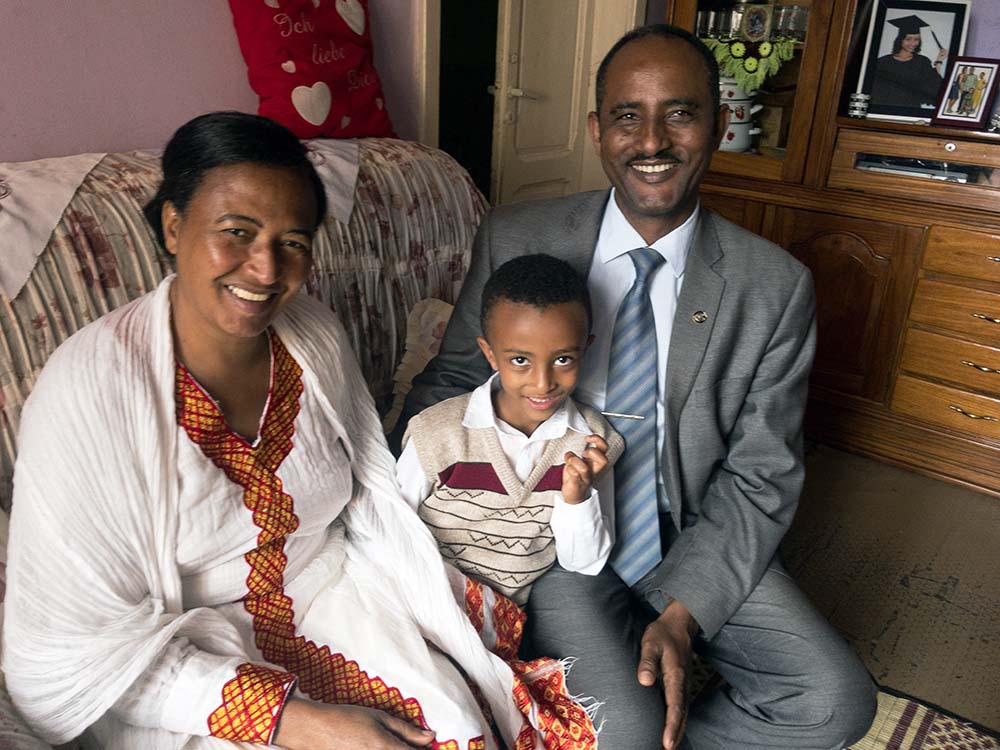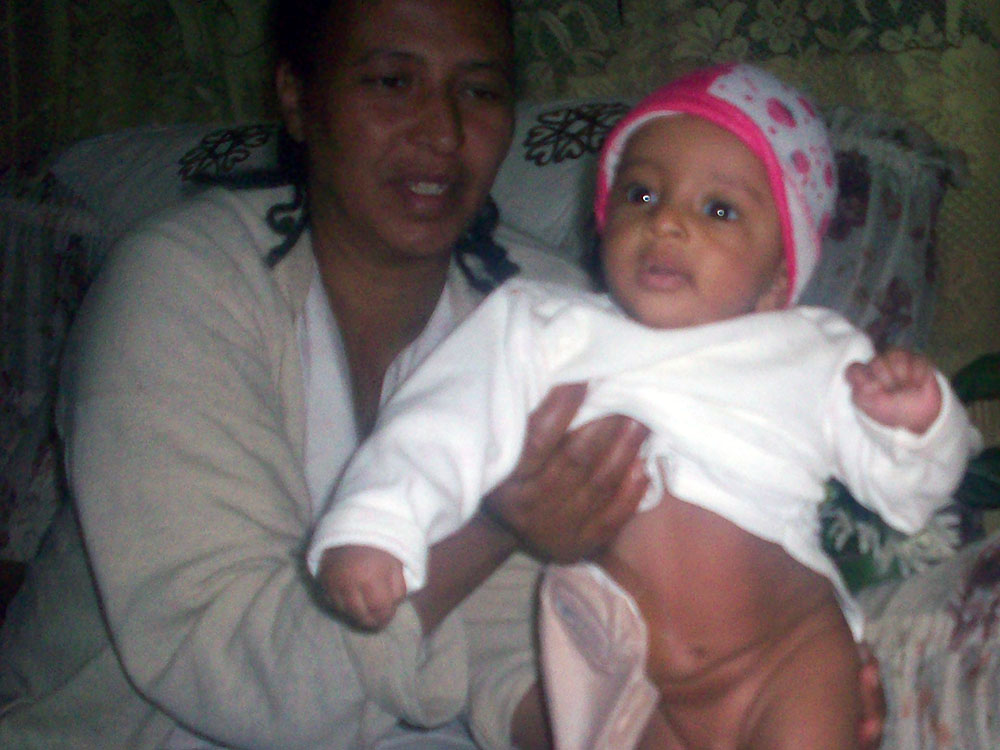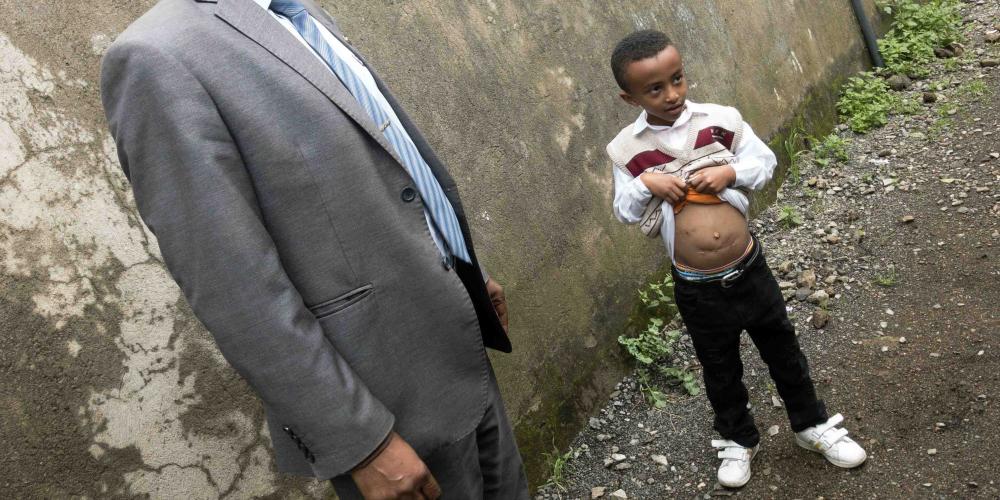Thanking God for the Toilet
Alazar Angaw Getahun is 7 and because he can go to the bathroom, he praises God.
Have you ever praised God for going to the bathroom?
Mother and Father were excited when a baby boy was born in Ethiopia’s capital, Addis Ababa, on Jan. 21. That same day, the baby and Mother came home from the hospital.
Mother hugged and nursed the baby. She and Father wondered what to name him.
That night, the baby’s tummy began to grow. It grew and grew. By morning, the tummy looked like a big, round balloon.
Father drove the baby and Mother back to the hospital. The doctor ran a series of tests, but she couldn’t find anything wrong. The boy’s tummy, however, continued to grow. By evening, it was so big and round that Mother was scared to touch it for fear that it would pop.
The hospital sent the baby to a bigger hospital, but its medical staff also couldn’t understand why the tummy was so big. The doctor said the only option was to operate on the baby.
“Let us open his tummy and see what is inside,” she said.
The parents agreed, and the baby was rushed into surgery. Several hours later, the doctor spoke with the parents.
“We looked inside and found that the baby’s large and small intestines are damaged,” she said. “So, we made a special hole on the right side of his body for a colostomy bag. He will not go to the bathroom like most other babies. Every time he goes to the bathroom, the waste will go into the bag.”
Infant Hospitalized
Father and Mother were not allowed to see the baby. He was small and weak and had to be placed in a ward for sick babies.
“This boy is in critical condition,” the doctor told the nurses. “He probably will not heal.”
Because of that, the nurses thought, “Why should we take care of the baby?”
The next morning, the nurses were surprised to see that the baby was still alive. But they were certain that he wouldn’t survive another day, so they ignored him again. The next morning, he was still alive. For nine days, the baby lived without anyone taking care of him. Waste spilled from his special bag and ran onto the wound from the tummy operation, causing it to become infected.
When the doctor saw the neglected baby, she was very unhappy.
“Why haven’t you taken care of the baby?” she asked the nurses.
She ordered the nurses to clean the baby’s wound three times a day and to put honey on it.
After 15 days, the infection began to go away. Finally, Mother was allowed to see her precious baby again. She cuddled and kissed him. She and Father had been praying for God to save him, and they decided to name him Alazar, which means Lazarus in Amharic, the most widely spoken language in Ethiopia.
“Like Lazarus, Jesus brought him back to life from the dead!” Father said.

Alazar Angaw Getahun with his mother and father in their home in Addis Ababa, Ethiopia. (Andrew McChesney / Adventist Mission)

Mother holding little Alazar with a colostomy bag attached to his side. (Family Photo)
Going Home
A month after his birth, Alazar returned home. Friends in the United States and Germany mailed boxes of colostomy bags for the baby to use. The bags are difficult and expensive to buy in Ethiopia, and a new bag has to be used every three days.
Alazar grew strong and big. He looked like other boys except for the bag attached to his side. Every month, he had to go to the hospital for a checkup. The doctor was glad to see that he was growing, but she worried about the bag. She didn’t know how to fix his body so he could live without it.
When Alazar was 1 ½ years old, the doctor ran some tests and saw that his intestines looked normal. She spoke with his parents.
“Let’s do another operation and put Alazar’s intestines back to where they are supposed to be,” she said. “If the operation is a success, he will be able to live like most people. If not …” her voice trailed off.
Father and Mother knew that if the operation failed, Alazar would have to live with the bag always. In Ethiopia, he might not live very long.
After the operation was over, Father and Mother were allowed to see their little boy lying on a hospital cot. The bag was gone and the hole in his side had been sewn shut.
“We will only know that the operation was successful if Alazar goes to the bathroom like most other babies,” the doctor said. “We will know that the operation was successful even if he passes gas. But he has to do one or the other tonight. Otherwise, the operation didn’t work.”
A Tense Night
Father and Mother stayed at the hospital all night. Mother hugged Alazar and waited. Father also waited. But Alazar didn’t go to the bathroom. He didn’t pass any gas. Two hours passed. Three hours. By 3 a.m., Father and Mother were crying. They prayed for Alazar to go to the bathroom.
At 4 a.m., Father asked Mother to hold up the baby. As Father took a closer look at the baby’s bottom, something fell to the floor. Little Alazar had gone to the bathroom!
Father jumped up and down and then fell on his knees to thank God. Mother was so happy that she could say anything. She cried.
Today, Alazar Angaw Getahun is 7 and praises God for going to the bathroom. He also praises God that he can play soccer and go swimming with the other children. The only reminder of his operations are two big scars on his tummy — one scar from the operation on his tummy, and the other scar from the place where the bag was attached.
When asked to show his scars, Alazar pulled up his shirt and pointed to his tummy.
“These marks show that Jesus saved my life and that I am His child,” he said. “Jesus is the one who healed me.”
Alazar Angaw Getahun praising God for healing him. In English and Amharic. (Andrew McChesney / Adventist Mission)





